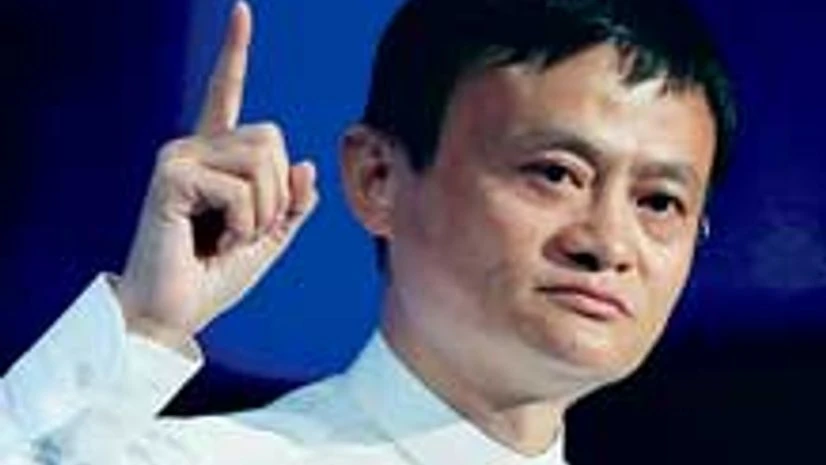Ma also said Indian sellers were the largest suppliers on Alibaba’s e-commerce platform after Chinese ones. “We have been doing B2B (business-to-business) for the past 15 years and, surprisingly, the second-largest suppliers to us are Indian sellers.” Indian suppliers were so smart they had caught the right opportunity, he said.
Ma’s visit, of less than 24 hours as part of a 100-member Chinese delegation, is the second India tour this year by a global e-commerce chief executive — the first being Amazon CEO Jeff Bezos’ in September. Among non-e-commerce global internet giants, Facebook founder & CEO Mark Zuckerberg had come to India last month.
Unlike both Bezos and Zuckerberg, who had multiple engagements in India, including meetings with the prime minister, Ma’s visit to India was a low-key one. The PM is currently in Nepal to attend a Saarc (South Asian Association for Regional Cooperation) summit.
Ma’s Alibaba has been in the news for its recent blockbuster $25-billion initial public offering on the New York Stock Exchange.
The Alibaba founder did not make specific announcements on investments in India, but the India-China summit on Wednesday resulted in signing of 12 memoranda of understanding, worth $2.4 billion, among companies from the two countries. Alibaba’s American rival Amazon had recently committed itself to investing $2 billion in India.
While Amazon entered the Indian market last year under a marketplace model, Alibaba is yet to start e-commerce operations in the country; at present, it only has a sourcing business here.
Speaking at the summit, Ma said Alibaba’s focus area in the coming years would be globalising and helping small businesses grow. “I was inspired and moved by PM Modi and this is a beautiful time for India and China to do business... Alibaba plans to further enhance technology for Indian sellers,” Ma said, adding he was keen to make more investments here.
A former English teacher, Ma spoke about how 400,000 Chinese were buying from India. He had no idea so many Chinese loved chocolates and tea from this country.
Alibaba has 8.9 million active sellers on its marketplace platform. By comparison, Flipkart, Snapdeal and Amazon have a little over 50,000 sellers each in India. Flipkart is aiming to get 100,000 sellers over the next 18 to 24 months.
In what could be an indication of its scale, Alibaba Group websites accounted for 60 per cent of the parcels delivered in China by March 2013 and 80 per cent of that country’s online sales by September 2014.
Ma’s visit to India generated all-round curiosity, including speculation on potential deals in the e-commerce market. There also was a buzz that Ma might meet Snapdeal co-founder & CEO Kunal Bahl, but the company said no such meeting was scheduled. In fact, Bahl has often referred to Snapdeal, the four-year-old company that became a marketplace player soon after launch, as the “Indian Alibaba”. There are existing synergies, too.
Recently, Snapdeal got a $627-million funding from Softbank, a Japanese telecom and internet corporation that also holds the biggest stake in Alibaba. Masayoshi Son, 57-year-old founder & CEO of SoftBank, had visited the Snapdeal office last month and addressed the company’s employees. Also, Snapdeal is one of the three e-commerce companies where Ratan Tata has put in money.
Indian e-commerce is still only about one per cent of the size of Chinese e-commerce market. But the sector here has become a favourite for investors.
Ma said internet could help transform lives in the current era. “Internet is a young business for young people, and India has a lot of young people. I was a teacher earlier and internet changed my life,” the Alibaba founder said.
Jack Ma in India:
* Indian sellers are the second largest on Alibaba’s B2B platform.
* Alibaba chairman Jack Ma said he is inspired by PM Modi and keen to invest more in India.
* About 400,000 Chinese people are buying from India; Alibaba has 8.9 million active sellers on its platform
* Flipkart, Snapdeal, Amazon and Ebay have in excess of 50,000 sellers each.
* Alibaba wants to enhance its technology for better service to Indian sellers.
* Ma vouched for mutual engagement between India & China as this is beautiful time to do business in India.
* Alibaba Group websites accounted for over 60 per cent of the parcels delivered in China.
* Chinese have been buying chocolates, tea among others from Indian sellers, claimed Ma.
* Recently, it created history of sorts when it recorded single day sales of more than $ 9 billion

)
